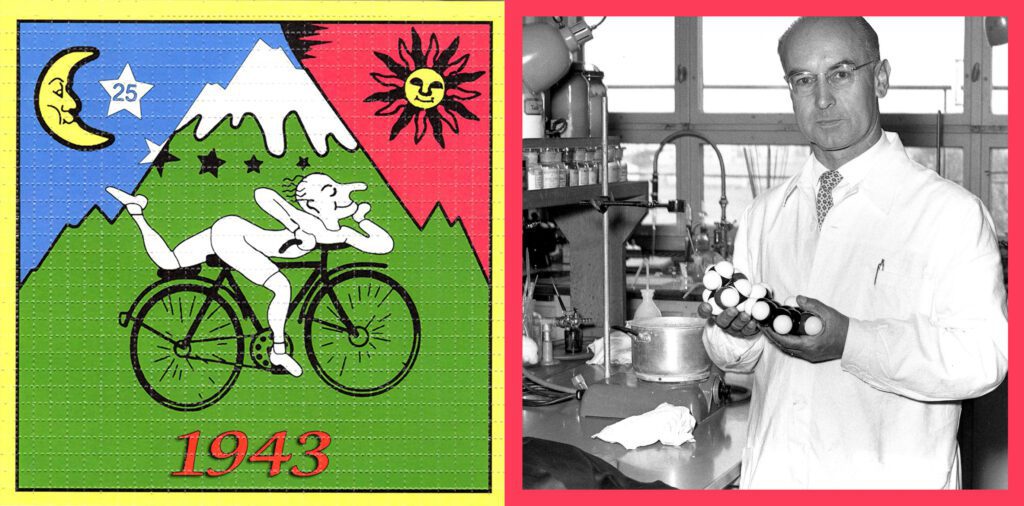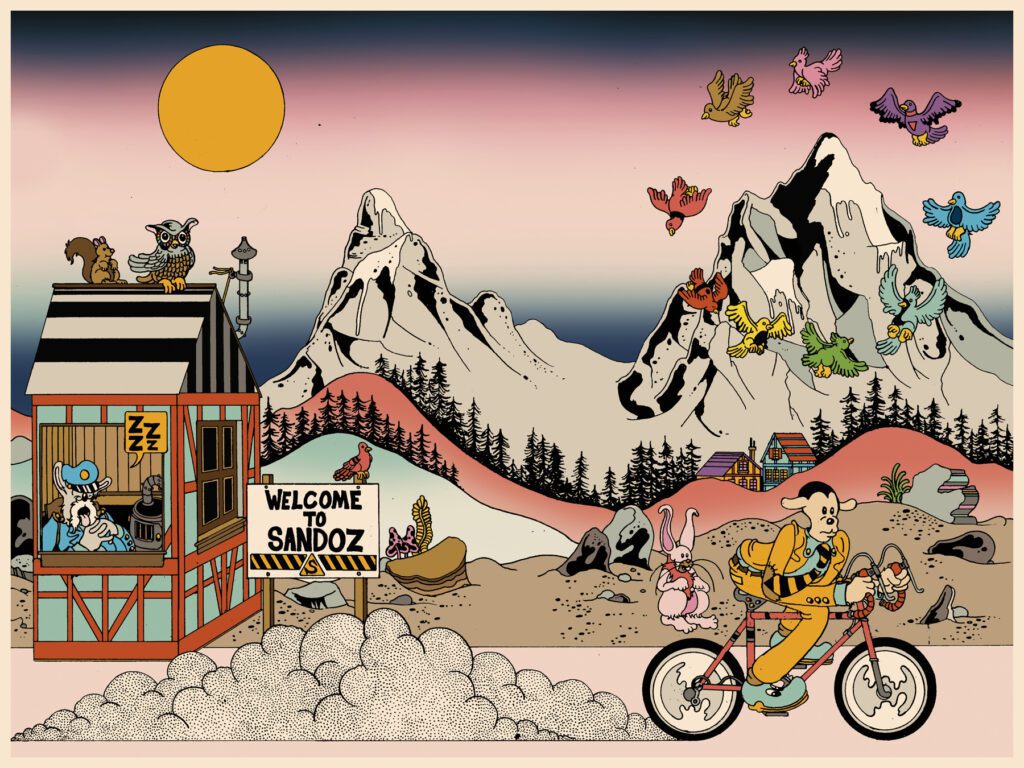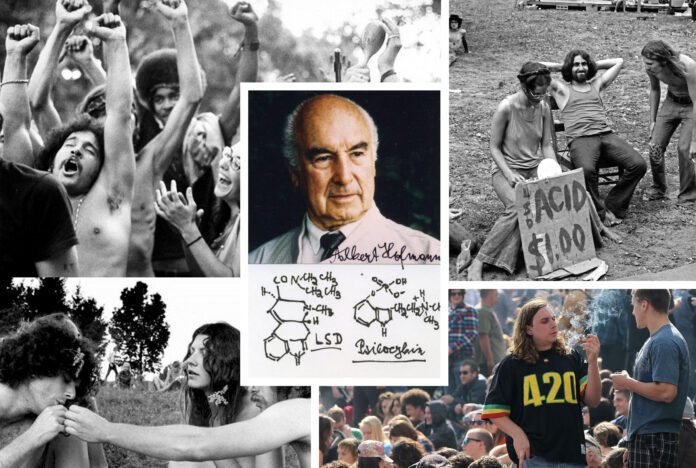As the world becomes more accepting of alternative lifestyles and substances, the significance of certain events continues to evolve. Two major counterculture celebrations, Bicycle Day and Cannabis Holiday 420, have risen to prominence in recent years.
Table of contents
- Introduction
- Bicycle Day: A Trip Through Time
- A Brief Introduction to 420
- Bicycle Day vs. 420: A New Era of Celebration
- The Influence of LSD on Culture and Science
- The Impact of Bicycle Day and 420 Weed Day on Society
- Bicycle Day and 420 Weed Day: Inspiring Art and Creativity
- Celebrating Bicycle Day and 420 Weed Day: Fun and Festivities
- The Future of Bicycle Day and 420 Weed Day
- Conclusion
Introduction
Let’s take a trip down memory lane, shall we? From Bicycle Day to 420 Weed Day, there’s more to these counterculture holidays than meets the eye. As we ride through their histories, we’ll discover the origins, significance, and lasting impact of these two days on society.
At first glance, Bicycle Day and 420 Weed Day might seem worlds apart. But beneath the surface, these two days share a common thread – the exploration of altered states of consciousness and the potential they hold for inspiring creativity and self-expression. Both LSD and cannabis have played significant roles in shaping counterculture movements and pushing the boundaries of societal norms. So, sit back, relax, and join us on this wild ride as we explore the origins, cultural significance, and connections between these two fascinating days. Let’s get the wheels turning!
Bicycle Day: A Trip Through Time
Bicycle Day, celebrated annually on April 19th, marks the first intentional ingestion of Lysergic acid diethylamide (LSD) by its discoverer, Swiss chemist Albert Hofmann. In 1938, Hofmann first synthesized LSD-25 while working for Sandoz, a Swiss chemical company, aiming to create a circulatory and respiratory stimulant. However, it wasn’t until April 19, 1943, when Hofmann accidentally discovered its potent psychoactive effects, changing the course of psychedelic history.
On April 19th, 1943, Hofmann intentionally ingested a small amount of LSD (250 micrograms), and the effects he experienced were quite remarkable. He became dizzy, had vivid hallucinations, and experienced a sense of euphoria. He later described the experience as a “dreamlike state” that was both “pleasant and frightening.”
After his experience, Hofmann became convinced that LSD had therapeutic potential and began to explore its effects on the mind. His experiments would later pave the way for a new era of research into the field of psychedelic therapy.

The Serendipitous Discovery
Dr. Hofmann’s groundbreaking journey began at his lab in Sandoz Pharmaceuticals, where he synthesized LSD while researching derivatives of ergot, a fungus that grows on rye. Little did he know that his discovery would change the course of psychedelic research and influence generations to come.
A Wild Ride — The First Bicycle Day
After ingesting the LSD dose, Dr. Hofmann started to feel its effects and decided to bike home. As he pedaled through the streets, he experienced vivid hallucinations and a deep sense of connection with the world around him. This transformative bike ride marked the birth of Bicycle Day, a day that has since been celebrated by psychonauts around the world.
A Brief Introduction to 420
Fast forward to April 20th, and we arrive at 420 Weed Day, a celebration of cannabis culture and the fight for marijuana legalization. The origins of the term “420” have been shrouded in mystery and lore, but most agree that it began with a group of high school friends in the 1970s known as the “Waldos”.
The Waldos and the Birth of 420
The Waldos were a group of students at San Rafael High School in California who would meet at a designated spot after school to smoke marijuana. They coined the term “420” as a code for their cannabis escapades.
Nicknamed “The Waldos” due to their chosen hangout spot—a wall outside their school—the friends would meet at 4:20 p.m. each week in search of a hidden cannabis plant rumored to be in the nearby Point Reyes Forest. Their meetings became a ritual, and “420” evolved into their code for smoking marijuana.

The Birth of a Movement
Although the Waldos never found the fabled marijuana plantation, their secret code caught on, spreading far and wide. The term “420” soon became synonymous with cannabis culture and evolved into an annual celebration and a rallying cry for marijuana legalization.
The term “420” started gaining popularity beyond The Waldos’ circle when one of the members, Mark Gravitch, landed a job as a roadie for the Grateful Dead’s bassist, Phil Lesh. The Grateful Dead’s fan base, known as “Deadheads,” adopted the code and helped spread it across the United States and beyond. Over time, 4:20 p.m. became recognized as the ideal time for smoking weed, and the number “420” became a symbol for cannabis culture.
Bicycle Day vs. 420: A New Era of Celebration
While both Bicycle Day and 420 hold significant importance in their respective communities, there are signs that Bicycle Day may soon overtake 420 as the leading counterculture celebration. The continued growth of the psychedelic community and the increasing recognition of the therapeutic potential of substances like LSD have contributed to the rising prominence of Bicycle Day. Furthermore, as cannabis legalization becomes more widespread, the need for a dedicated day of advocacy may lessen, allowing Bicycle Day to emerge as the leading celebration for both the psychedelic and cannabis communities.
The Influence of LSD on Culture and Science
The discovery of LSD’s effects has had a significant impact on both culture and science. In the 1960s, LSD played a central role in the counterculture movement, influencing music, art, and social activism. Prominent figures such as Timothy Leary, Ken Kesey, and Owsley Stanley advocated for the use of psychedelics as a means to explore consciousness and human potential.
Today, there is a renewed interest in the therapeutic potential of LSD and other psychedelics. Researchers are investigating the potential benefits of these substances in treating various mental health conditions, such as depression, anxiety, and post-traumatic stress disorder (PTSD).
Recent years have seen a resurgence of interest in the therapeutic applications of psychedelic substances, such as LSD and psilocybin. Numerous clinical trials and studies have demonstrated the efficacy of these compounds in treating a wide range of mental health disorders, including depression, anxiety, PTSD, and addiction. Bicycle Day serves as a reminder of the potential benefits these substances can offer when used responsibly and under the guidance of trained professionals.
Bicycle Day serves as a powerful reminder of the untapped potential of psychedelics to enhance our understanding of the human experience. As we continue to explore the depths of consciousness and the mysteries of the universe, this unique celebration not only honors the legacy of Albert Hofmann but also fosters a brighter future for humanity. Through responsible psychedelic exploration, advocacy, and education, we can collectively embrace a new era of interconnectedness and personal growth.
The Impact of Bicycle Day and 420 Weed Day on Society
Changing Perceptions
Both Bicycle Day and 420 Weed Day have played a significant role in shifting societal attitudes toward mind-altering substances. They’ve opened the door to conversations about the potential benefits and risks associated with psychedelic substances and cannabis, and have contributed to a more balanced understanding of their effects on mental health and overall well-being.
By bringing marijuana enthusiasts together, 420 celebrations help to dispel common misconceptions and stigmas surrounding cannabis use.
Advocating for Legalization and Research
These counterculture holidays have also fueled the fight for legalization and further research. As a result, we’ve seen a resurgence of interest in the therapeutic potential of psychedelics like LSD and psilocybin mushrooms, as well as the widespread legalization of medical and recreational marijuana in various parts of the world.
Education and Harm Reduction
While Bicycle Day and 420 Weed Day are often associated with celebrations and festivities, they also serve as important opportunities to educate the public about the responsible use of psychedelics and cannabis. Harm reduction initiatives, including workshops on safe consumption practices, and discussions on the potential risks and benefits of these substances, have become integral parts of these counterculture holidays.
The Intersection of Spirituality and Mind-Altering Substances
For many people, the use of mind-altering substances like LSD and cannabis is not just about recreational enjoyment but also serves as a means to explore their spirituality and deepen their connection with the world around them. Bicycle Day and 420 Weed Day can provide opportunities for individuals to engage in spiritual practices and reflect on the role these substances play in their personal growth and self-discovery.
Bicycle Day and 420 Weed Day: Inspiring Art and Creativity
The Psychedelic Art Movement
The influence of Bicycle Day and 420 Weed Day extends beyond the realm of science and politics, as they have also inspired a vibrant and imaginative art movement. Psychedelic art, characterized by its bold colors, intricate patterns, and surreal imagery, often draws inspiration from the experiences of those who have experimented with LSD and cannabis. This artistic style has left a lasting impact on various creative fields, including visual arts, music, fashion, and graphic design.

Music and Counterculture
Music has long been intertwined with the counterculture movements associated with Bicycle Day and 420 Weed Day. Iconic musicians like The Beatles, Jimi Hendrix, and Bob Marley have not only experimented with mind-altering substances but have also used their music to promote messages of peace, love, and freedom. These artists have played a crucial role in shaping the cultural identity of these counterculture holidays and continue to inspire new generations of musicians and fans alike.
Celebrating Bicycle Day and 420 Weed Day: Fun and Festivities
Groovy Gatherings and Psychedelic Soirees
Bicycle Day and 420 Weed Day are often marked by gatherings, festivals, and events that bring people together to celebrate and advocate for their respective causes. Art, music, and community are at the heart of these celebrations, with psychedelic art exhibitions, live concerts, and educational workshops taking center stage.
Food for Thought (and the Munchies)
Both holidays are also known for their culinary delights. Edible treats infused with cannabis or inspired by psychedelic experiences have become popular ways to indulge in the spirit of these counterculture holidays, from magic mushroom-shaped cookies to pot brownies.
The Future of Bicycle Day and 420 Weed Day
New Frontiers in Research and Legislation
As our understanding of psychedelics and cannabis continues to evolve, so too will the ways in which we celebrate and honor Bicycle Day and 420 Weed Day. With the potential for groundbreaking discoveries in the fields of mental health, neuroscience, and pharmacology, these counterculture holidays may soon come to symbolize not just a celebration of personal freedom but also a recognition of the incredible scientific advancements that can arise from questioning the status quo.
Building Inclusive and Compassionate Communities
As we look to the future, it’s essential that we strive to create inclusive and compassionate communities around the celebration of Bicycle Day and 420 Weed Day. By fostering open dialogue, promoting education, and encouraging responsible and mindful use of mind-altering substances, we can work together to ensure that these counterculture holidays continue to inspire curiosity, creativity, and positive change for years to come.
So, let’s raise a toast to Bicycle Day and 420 Weed Day, and to the wild ride they’ve taken us on. Here’s to embracing the spirit of these counterculture holidays, pushing boundaries, and continuing to explore the vast and fascinating world of psychedelics and cannabis.
Conclusion
From Bicycle Day, riding into 420 Weed Day, these two counterculture holidays have left an indelible mark on society. By challenging conventional wisdom and encouraging open-mindedness, they’ve paved the way for groundbreaking research and transformative conversations about mind-altering substances. Happy Bicycle Day and 420 Weed Day!
What is Bicycle Day?
Bicycle Day, celebrated on April 19th, is a counterculture holiday that commemorates the first intentional ingestion of LSD by Swiss chemist Dr. Albert Hofmann in 1943. The name “Bicycle Day” refers to the bike ride he took while experiencing the effects of the drug.
What is 420 Weed Day?
420 Weed Day, celebrated on April 20th, is a counterculture holiday that celebrates cannabis culture and advocates for marijuana legalization. The term “420” originated from a group of high school friends in the 1970s known as the “Waldos,” who used it as a code for their marijuana-related activities.
How have Bicycle Day and 420 Weed Day impacted society?
Both counterculture holidays have played a significant role in changing societal attitudes towards mind-altering substances, sparking conversations about the potential benefits and risks of psychedelics and cannabis. They have also fueled advocacy efforts for legalization and further research into the therapeutic potential of these substances.
How do people typically celebrate Bicycle Day and 420 Weed Day?
Bicycle Day celebrations often include psychedelic art exhibitions, music events, and introspective activities. 420 Weed Day is marked by gatherings to enjoy cannabis, attend themed events, and advocate for legalization and acceptance of marijuana.
What connects Bicycle Day and 420 Weed Day?
Both days involve the exploration of altered states of consciousness and their potential to inspire creativity, self-expression, and counterculture movements.
